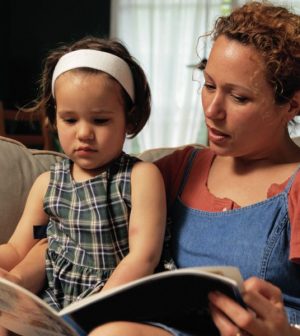- Could Your Grocery Store Meat Be Causing Recurring UTIs?
- Are You Making This Expensive Thermostat Error This Winter?
- Recognizing the Signs of Hypothyroidism
- 10 Strategies to Overcome Insomnia
- Could Artificial Sweeteners Be Aging the Brain Faster?
- Techniques for Soothing Your Nervous System
- Does the Water in Your House Smell Funny? Here’s Why
- Can a Daily Dose of Apple Cider Vinegar Actually Aid Weight Loss?
- 6 Health Beverages That Can Actually Spike Your Blood Sugar
- Treatment Options for Social Anxiety Disorder
Toddlers May Gain More From Paper Books Than E-Books: Study

When it comes to reading to toddlers, apparently there is no substitute for an old-fashioned book.
That’s according to new research that found paper books foster better parent-child interactions than electronic books do.
This held true even when comparing print books against very basic e-readers that don’t contain distracting elements like sound effects or animation, noted lead researcher Dr. Tiffany Munzer. She is a fellow in developmental behavior pediatrics at the University of Michigan’s C.S. Mott Children’s Hospital.
“Parents and children also had a lower quality of interaction over even this basic electronic book without these fancier features,” Munzer said. “There’s something about the tablet itself. These devices do not lend themselves to a shared experience.”
Parents and toddlers talked more when reading print books, and were more apt to work together to perform tasks like holding the book and turning pages, Munzer and her colleagues found.
Toddlers presented with an e-book became more focused on the tasks of tapping or swiping the screen, instead of focusing on the story being told or the parent reading to them.
Parents also became distracted with e-books, tending to talk less about the story and more about the device itself. For example, they might spend more time telling the toddler how to work the tablet and less time actually reading from it.
The findings were published online March 25 in the journal Pediatrics.
“We always thought the enhanced e-books, with all their distractions, interfered with reading,” said Dr. Suzy Tomopoulos, an assistant professor of pediatrics at the NYU School of Medicine. “But it wasn’t only the enhancements that made these books underperform. I think it also has to do with the fact that they are harder to share and more individual.”
Previous research has shown that preschoolers and young school-age children tend to gain less from reading e-books than print books, the researchers said in background notes. The kids appear to have lower reading comprehension, and are less likely to remember specific events and details from the story.
But there have been very few studies regarding toddlers and parents sharing e-books, which is “an important gap in the literature,” Munzer said.
“Toddlers have this burgeoning attentional capacity and they might be more susceptible to some enhancements or distractions” contained in e-books, Munzer explained.
For this study, the researchers observed 37 parent-toddler pairs reading together in a laboratory using three different book formats — print, basic e-readers and enhanced e-books on tablets.
The three books were all from Mercer Mayer’s “Little Critter” series, and were similar in length and reading difficulty.
The basic e-books allowed for swiping to turn the pages and tapping illustrations to elicit the appearance of words, but there was no auto-narration or sound effects.
The enhanced e-books carried all the bells and whistles — tapping a picture of a dog might cause the dog to bark or move about, or turning the page to a beach would produce the sound of an ocean wave crashing.
Researchers found that parents sharing a print book with their child tended to talk more, in the subtle sorts of interactions that can go a long way in promoting healthy child development, researchers found.
For example, the mom or dad might point to a picture of an animal and ask their child what sound it makes. They were also more inclined to relate the story to their child’s personal experiences — “Remember when we went to the beach?”
These are the sorts of things that make shared reading such a rich experience for toddlers, and they don’t happen as often even with basic e-readers, said Tomopoulos, who wrote an editorial accompanying the new study.
“Parents need to expand on what they’re reading in the book, and they should expand it based on their child’s interests,” Tomopoulos said. “If you’re reading about a character going to the zoo, you can say, ‘Remember we went to the zoo last weekend? What animals did we see?’ That back-and-forth interaction is really what fosters early child development and language development.”
Tablets and e-readers have become so popular and handy that it’s unlikely parents can cut them completely out of reading time, but both Munzer and Tomopoulos encouraged moderation in their use.
“I would recommend having parents really use more of the print book rather than the e-book, and if they’re using the e-books, find some happy medium like not focus on distracting features and trying to verbalize more when reading the book,” Tomopoulos said.
More information
Visit the nonprofit Reach Out and Read for more on the importance of reading to children.
Source: HealthDay
Copyright © 2026 HealthDay. All rights reserved.










